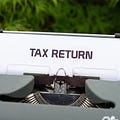The Biden administration has ambitious plans to spend over $2 trillion – an alleged “one-time” capital investment in our nation’s infrastructure. This spending is to be paid for largely by higher taxes on corporations. Biden’s “soak the rich” campaign rhetoric included a promise not to raise taxes on anyone earning under $400,000 a year. My question: Is his proposal to raise the corporate income tax rate from 21 to 28% breaking his promise?
Who bears the burden?
This week, I welcome the Wall Street Journal’s U.S tax policy reporter Richard Rubin to the show to help break down the concept of tax incidence, and explore the hidden downstream effects of increasing taxes on “the rich.” Rubin is a neutral observer with no particular agenda other than to help readers understand what to expect when politicians in Washington D.C. change the tax code.
The key question, Rubin says, is who actually pays the price? The corporations themselves? Corporate profits will suffer, as Biden seems to expect, as will the shareholders. But what about workers who depend on corporate investment in capital to enhance their productivity, and pay them living wages?
Jobs, Jobs, Jobs
The President assures us that the infrastructure bill will boost jobs, but we must always make visible the unseen effects of pulling a dollar out of the private sector in order to spend it elsewhere.
Share this post

Auditing the Corporate Income Tax
www.bobzadek.com
The Bob Zadek Show
Bob talks about the issues that affect our lives on a daily basis from a purely libertarian standpoint. He believes in small government, fewer taxes, and greater personal freedom.<br /><br />America has lost its way, but it cannot and does not need to be reinvented. Our founders were correct about their approach to government, as were John Locke, Adam Smith and the other great political philosophers who influenced them. The country’s first principles are economic and social freedom, republicanism, the rule of law, and liberty. Bob believes we must take the best of our founding principles and work from them because a country without principles is just a landmass.
Bob talks about the issues that affect our lives on a daily basis from a purely libertarian standpoint. He believes in small government, fewer taxes, and greater personal freedom.<br /><br />America has lost its way, but it cannot and does not need to be reinvented. Our founders were correct about their approach to government, as were John Locke, Adam Smith and the other great political philosophers who influenced them. The country’s first principles are economic and social freedom, republicanism, the rule of law, and liberty. Bob believes we must take the best of our founding principles and work from them because a country without principles is just a landmass.Listen on
Substack App
RSS Feed
Recent Episodes













Auditing the Corporate Income Tax